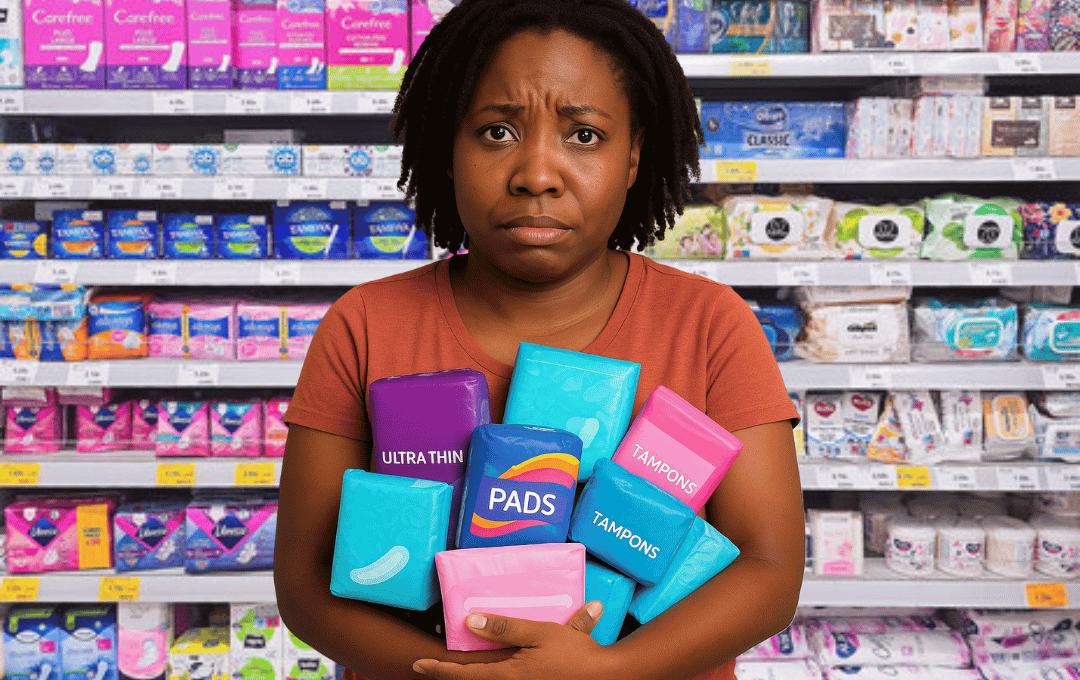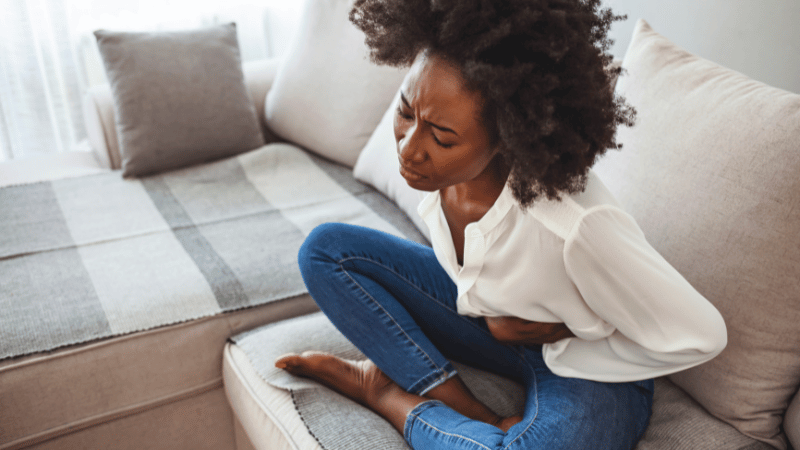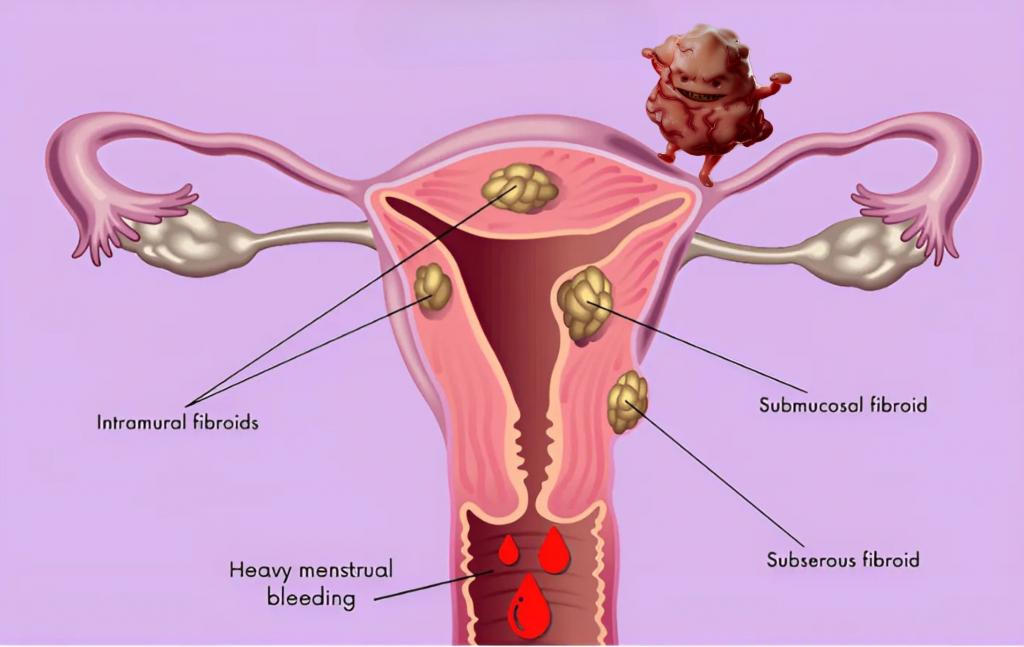
So you’ve heard that heavy periods are just a fact of life. But what if they didn’t have to be? If you’re constantly changing pads or tampons, canceling plans because of a heavy flow, or feeling so exhausted you can barely function, it’s time to stop normalizing the discomfort. That kind of bleeding might not be “normal” at all.
Heavy menstrual bleeding, medically known as menorrhagia, can be a red flag for underlying health conditions such as uterine fibroids, hormonal imbalances, or other gynecological concerns. Recognizing the signs early not only prevents complications, such as iron-deficiency anemia, but also allows for a timely diagnosis, which can lead to a treatment that helps you feel like yourself again.
In this blog, we’ll walk you through the key signs of a period that’s too heavy, the most common causes, and what to do next.
How Much Blood Is Too Much During a Period?
While a doctor can give you an exact diagnosis, a good rule of thumb is that losing more than five tablespoons of blood per cycle is considered heavy. Since you can’t exactly measure this, pay attention to these practical signs that signal you’re bleeding more than the average person.
Signs You’re Losing Too Much Blood During Your Period
Along with monitoring the amount of bleeding during your period and any associated symptoms, you should also take note of both the duration and intensity.
Here are some common signs you’re losing too much blood during your period:
- Bleeding that lasts more than 7 days
- Waking up to change period products multiple times per night
- Soaking through tampons or pads every hour, several hours in a row
- Needing to double up on pads or wear longer or booster pads during the day
- Passing blood clots larger than a quarter
If you recognize these signs, consult a medical specialist, as excessive bleeding during your period could be alerting you to an underlying gynecological condition.
What Are the Most Common Causes of Heavy Periods?
Understanding what’s behind your heavy menstrual bleeding can be the first step in finding relief. The causes can range from common conditions to more complex health issues.
Uterine Conditions
Structural changes or growths in the uterus, such as polyps or fibroids, can cause heavy periods.
- Uterine polyps are benign growths on the uterine lining that can trigger irregular bleeding, spotting between periods, or heavier flows.
- Uterine fibroids are noncancerous tumors growing in or on the uterine wall that vary in size and location. Even small fibroids can cause prolonged or heavy periods.
- Adenomyosis is when the uterine lining grows into the muscular wall of the uterus, causing prolonged bleeding, bloating, and painful cramps. This condition is easy to confuse with endometriosis.
Hormonal Imbalances
Your menstrual cycle depends on a balance between estrogen and progesterone. When these hormones are out of sync, the uterine lining may thicken too much, leading to heavier bleeding when it’s shed.
These hormonal imbalances are most common in teenagers and perimenopausal women. Certain medications, like hormone therapies and blood thinners, may also lead to heavy menstrual bleeding.
Other Underlying Health Conditions
Heavy periods can be a symptom of more complex gynecological disorders, like adenomyosis, endometriosis, and polycystic ovary syndrome (PCOS).
- Endometriosis is a chronic condition where uterine-like tissue grows outside the uterus, often leading to intense pain, fatigue, and heavy or irregular periods.
- Polycystic Ovary Syndrome (PCOS) is a hormonal disorder that disrupts regular ovulation, often resulting in irregular, absent, or heavy menstrual bleeding. It may also cause acne, excess facial hair, or difficulty with fertility.
Is a Heavy Period a Sign of Pregnancy?
Heavy periods are not a sign of pregnancy. A true menstrual period does not occur while you are pregnant. However, spotting can happen, especially in early pregnancy, and is sometimes confused with a light period. Pregnancy spotting, including implantation bleeding, is usually much lighter and shorter than a regular period.
How Fibroids Cause Heavy Menstrual Bleeding
Uterine fibroids are one of the most common causes of heavy periods. These noncancerous tumors can disrupt your menstrual cycle by:
- Adding pressure to the uterine lining increases menstrual bleeding.
- Interfering with uterine contractions to prevent the body from properly stopping bleeding.
- Increasing blood vessel growth leading to irregular or prolonged bleeding.
The size, number, and location of fibroids determine the severity of excessive bleeding during your period, leading to secondary symptoms such as:
- Anemia
- Pelvic or back pain
- Fatigue and dizziness
- Clotting
- Breakthrough bleeding between periods
What Type of Fibroid Causes the Heaviest Bleeding?
The type of fibroid most likely to cause the heaviest menstrual bleeding is the submucosal fibroid. A submucosal fibroid develops beneath the lining of the uterus (endometrium) and is most likely to cause extreme heavy menstrual bleeding, even if they are small. These fibroids can cause even more issues if they are pendunculated (attached by a stalk), as they can twist, causing pain and heavier bleeding.
A diagnosis from a medical professional can help determine the type and size of your fibroids, thereby preventing more serious issues from developing and providing you with more treatment options to manage fibroid symptoms.
The Impact of Heavy Periods on Overall Health
If the cause of chronic heavy periods is left untreated, it can negatively impact your health beyond menstruation. One of the most common complications is iron-deficiency anemia. This condition can cause:
- Constant fatigue
- Difficulty concentrating or “brain fog”
- Shortness of breath
- Cold hands and feet
Heavy menstrual bleeding can also interfere with daily activities, work, school, and personal relationships. Whether caused by uterine fibroids or another condition, early evaluation is key. Addressing the underlying cause can help relieve symptoms, improve your quality of life, and prevent more severe health issues from developing.
The Awkward Truth About Heavy Periods: By The Numbers
The following chart, drawn from a study conducted by WaterAid in collaboration with Morar Consulting, illustrates the extent to which women face period-related challenges.
| Stat | Finding |
| 67 % | Women have adapted their lifestyle due to period fears. |
| 75% | Women regularly fear an awkward “period drama”. |
| 76% | Fear of leaking blood onto their clothes in public. |
| 55% | Dread having a bad smell during their period. |
| 42% | Worry about having to hide period products. |
| 42% | Worry about not knowing where the next toilet is. |
| 29% | Fear sneezing and causing a leak. |
| 25% | Crave huge amounts of chocolate. |
| 81% | Would never ask a stranger for a sanitary product. |
| 37% | Would not even ask a friend or colleague. |
| 89% | Agree that men have an advantage for not dealing with periods. |
| 15% | Have taken sick leave because of period pain. |
| 6% | Report having no period-related fears. |
However, when uterine fibroids cause these issues, the concerns can be much more severe, leading to excessively heavy and prolonged bleeding. It’s important to explore effective treatment options available to address these specific symptoms.
Treatment Options for Fibroid-Related Bleeding
If fibroids are causing your heavy periods, non-surgical treatment options like uterine fibroid embolization (UFE) can help.
UFE blocks blood flow to the fibroids so that they shrink and reduce symptoms like excessive bleeding during your periods and pelvic pain. As an outpatient procedure with a short recovery period, UFE is an ideal option for individuals seeking relief without major surgery.
Consulting a fibroid specialist can help determine whether your symptoms are fibroid-related and develop a personalized treatment plan based on your needs.
Get Answers & Relief From Heavy Periods
USA Fibroid Centers specializes in UFE treatment to help reduce heavy menstrual bleeding and improve quality of life. Our experienced physicians offer expert evaluation and custom treatment plans tailored to your specific needs.
Find relief from fibroid-related heavy periods by scheduling a consultation with USA Fibroid Centers today.





